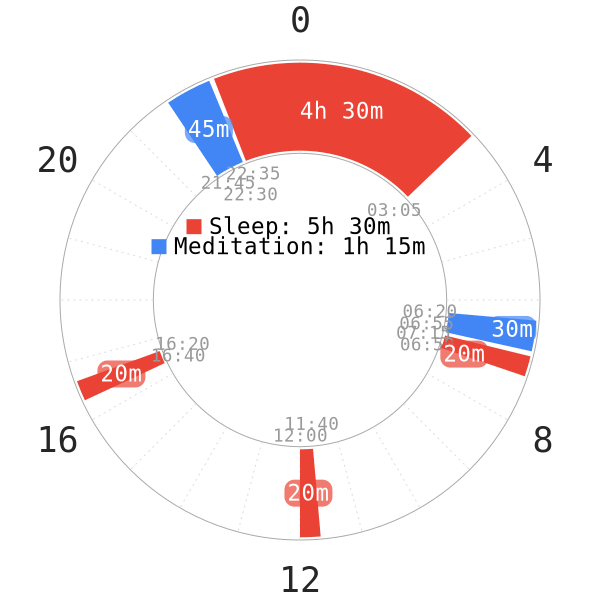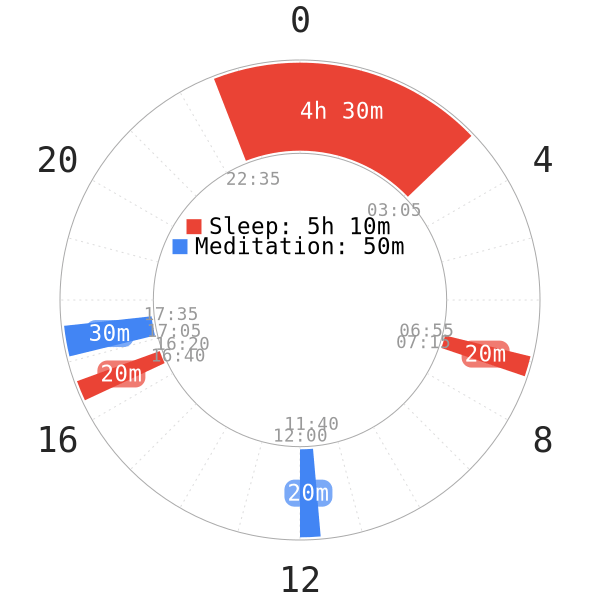Introduction
Meditation has long been a massively powerful yet familiar with the religious population. Specifically, it has been a daily and consistent part of Buddhist monks for a long time. Nowadays, though, a lot of non-religious individuals also practice meditation, under various poses and forms. For a long time, meditation’s effects on human sleep have been a fascinating topic for further exploration.
In the context of polyphasic sleeping, there is, nevertheless, an extreme scarcity of literature. With the few available sources on napping and this mentation practice, we look forward to extensive future studies on polyphasic sleeping.
Yoga, a Form of Meditation
Because there is a wide array of forms, yoga is only a minor fraction of this practice. Refer to this attached article to find more information about how yoga can aid with sleep quality. For the scope of this post, however, we will only cover some specific meditative activities/poses in particular. We will also postulate certain niches of such meditative methods for polyphasic sleepers.
Meditation & Sleep EEG Mechanics
Over the years, there have been rather heated debates in the polyphasic community about the utility of meditation. Some people say it can reduce their sleep duration by a ton, while others report no use; rare examples cannot even meditate because of some of their personal health problems. Obviously, meditation is a controversial topic when it comes to health and earnest polyphasic sleepers; currently, there is unfortunately not sufficient data to draw conclusions otherwise.
We will display certain data from studies on this topic below; hopefully it will shed some light on its relationship with sleep, and ultimately polyphasic sleep.
Meditation & Wakeful State
- Regular meditative practices often masquerade “actual sleep”, or at least some people believe so. Despite the similarity of the alpha waves during meditation and the low delta waves (which is present in SWS), meditation and eye-closed actions do not resemble a state of sleep1,2.
- This practice is more like the state between sleep and wake, or a transitional period of relaxation2.
- Meditators often activate the parasympathetic nervous system via the wakeful hypo-metabolic state3. Specifically, they are technically still awake, but cool down their body with the relaxation.
Based on these observations across multiple studies, it is usually the case that NREM1 dominates meditative activities.
Sleep Architecture in Meditators
NOTE: This section may contain somewhat conflicting information.
- Meditation is capable of reducing a significant amount of total sleep in veteran meditators compared to novice or non-meditators1,4. Nevertheless, long-term meditators often spend hours on meditating daily.
- Cyclic meditation, which consists of yoga postures and supine rest, dramatically boosts SWS duration while lowering REM duration. Furthermore, it also increases total sleep duration5. Practicing this type of meditation twice a day can yield such results.
- Surprisingly, meditation can also increase arousal during sleep, leading to less SWS duration4. However, all subjects in such a trial showed enhanced wakefulness and decreased sleep duration.
- Sleep onset latency is overall much less in experienced meditators than in non-meditators or novice equivalents3.
- Long-term Vipassana practitioners have more REM cycles, increased SWS duration and less NREM2 duration per night3.
- Middle-age practitioners of Sudarshan Kriya yoga were able to sustain their SWS baseline while non-practitioners perpetually get a low SWS amount each day6.
- Meditation can in fact worsen sleep quality in some individuals, from a meta-analysis7. Additionally, a lot of observations on sleep quality and at-home practices remain inconclusive.
- Certain Vipassana practitioners incur reduced quantity of sleep spindles8; this surprisingly contradictory finding is also in line with neurodegenerative diseases like schizophrenia. This study, however, cannot provide a satisfactory explanation.
Meditation & Polyphasic Sleep
During Adaptation

Because of the great utility of meditation, you can rely on it during adaptation. Our tips are as follows:
- Try to spare some time before your core sleep(s) to meditate. It would help cool you down and prepare you for a a rest session.
- Schedules with a decently high total sleep (e.g, at least 6 hours) can go well with meditation. This is because of their overall lower sleep pressure; you may have more trouble falling asleep in a certain sleep block, or short naps when first starting out.
- Meditation usually fits adaptation stage 1 because at this stage, you often have trouble falling asleep. As a result, practicing meditation can reduce your own sleep onset.
- If you are constantly tired because of a perpetually low SWS duration each day, consider taking up meditation; it is at least worth a try to maintain and even boost SWS duration.
After Adaptation

- After your adaptation, your meditative habits may give you the benefits of certain memory consolidation9 ability.
- In this study, self-guided meditation has a better advantage than the napping group. Especially the nappers who entered SWS upon awakening had to deal with a lot of sleep inertia.
- Self-guided meditation is denoted as quiet wakefulness.
- Quiet wakefulness fostered better declarative memory consolidation than naps ending with SWS.
- However, the study did not account for habitual nappers or adapted polyphasic sleepers. Hence, meditation’s true effects may not outperform habitual and experienced napping.
- If you do not have time to cool down for a nap and have to skip it (after adaptation), you can focus on your breath and meditate instead. This way it can help refresh you a bit until the next sleep session.
- Meditation, including yoga, is also a great self-care method for a lot of people. This is because you may relieve stress and anxiety with it.
- 20-minute naps and self-guided breathing three times weekly can improve mental health and well-being of medical students10.
- Heart-rate variability biofeedback was the prime focus, which is somewhat similar to autogenic training.
Anecdotes from the Community
- A Uberman sleeper, who stayed on the schedule for 1.5 months, used meditation to help him adapt to Uberman by the 4th week.
- In addition, he is an average sleeper with normal sleep requirements.
- However, his brief stay on the schedule questions the validity of whether he had fully reached the adapted state, even with barely any oversleep.
- It is also unknown how long he could sustain the schedule because the reason for quitting was unclear.
- Meditation greatly helped an ADHD biphasic sleeper reduce her sleep onset for nocturnal sleep.
Other Notes
- During the later adaptation stages, you may have to forfeit meditative practice temporarily. This is because closing your eyes is an immediate recipe for oversleeping. In fact, you can instantly oversleep after mere seconds of closing your eyes.
- If you have an EEG, you may check if your meditation habits can affect your SWS and REM requirements. Though highly individualistic, you would not want to raise your vital sleep durations when adapting to a reducing schedule!
- So far, there is still no deciding evidence that meditation can completely replace night sleep, or a certain amount of sleep. Therefore, you should not entirely hope that meditation will help you with less sleep.
- Even if meditation can anecdotally “replace” sleep like certain extreme polyphasic sleepers claim, you likely have to stick to it everyday and for hours daily. Thus, the real “advantage” that you can get out of “less actual sleep” is not very noticeable while you have to cling to this practice very frequently to protect your low total sleep.
Main author: GeneralNguyen
Page last updated: 15 February 2021
Reference
- Kaul, Prashant, et al. “Meditation acutely improves psychomotor vigilance, and may decrease sleep need.” Behavioral and Brain Functions 6.1 (2010): 1-9. [PubMed]
- Britton, W. B., Lindahl, J. R., Cahn, B. R., Davis, J. H., & Goldman, R. E. (2013). Awakening is not a metaphor: the effects of Buddhist meditation practices on basic wakefulness. Annals of the New York Academy of Sciences, 1307(1), 64–81. doi:10.1111/nyas.12279. [PubMed]
- Maruthai, N., Nagendra, R. P., Sasidharan, A., Srikumar, S., Datta, K., Uchida, S., & Kutty, B. M. (2016). Senior Vipassana Meditation practitioners exhibit distinct REM sleep organization from that of novice meditators and healthy controls. International Review of Psychiatry, 28(3), 279–287. doi:10.3109/09540261.2016.1159949. [PubMed]
- Kohler, M., Rawlings, M., Kaeding, A., Banks, S., & Immink, M. A. (2017). Meditation is Effective in Reducing Sleepiness and Improving Sustained Attention Following Acute Sleep Restriction. Journal of Cognitive Enhancement, 1(2), 210–218. doi:10.1007/s41465-017-0032-5.
- Patra, Sanjib, and Shirley Telles. “Positive impact of cyclic meditation on subsequent sleep.” Medical Science Monitor 15.7 (2009): CR375-CR381. [PubMed]
- SULEKHA, S., THENNARASU, K., VEDAMURTHACHAR, A., RAJU, T. R., & KUTTY, B. M. (2006). Evaluation of sleep architecture in practitioners of Sudarshan Kriya yoga and Vipassana meditation. Sleep and Biological Rhythms, 4(3), 207–214. doi:10.1111/j.1479-8425.2006.00233.x.
- Rusch, H. L., Rosario, M., Levison, L. M., Olivera, A., Livingston, W. S., Wu, T., & Gill, J. M. (2018). The effect of mindfulness meditation on sleep quality: a systematic review and meta-analysis of randomized controlled trials. Annals of the New York Academy of Sciences. doi:10.1111/nyas.13996. [PubMed]
- Solomonova, Elizaveta, et al. “Different Patterns of Sleep-Dependent Procedural Memory Consolidation in Vipassana Meditation Practitioners and Non-meditating Controls.” Frontiers in psychology 10 (2020): 3014. [PubMed]
- Dastgheib, Mohammad. “The Effects of Self-Guided Meditation and Napping on Memory Consolidation in Humans.” (2020).
- Hernandez, Caridad, et al. “A Pilot Study Examining Biofeedback and Structured Napping to Promote Medical Student Wellbeing.” MedEdPublish 8 (2019).
